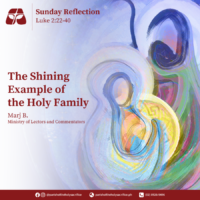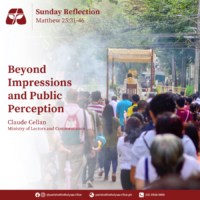Sunday Gospel Reflection
Twelfth Sunday in Ordinary Time
Mark 4:35-41
Abiding Love and Presence
JM Nuqui
Campus Minister
It was March 2020.
From our rural exposure in Nueva Vizcaya, we went to Muntinlupa and Bilibid Prison for our urban poor and prison apostolate. We were halfway through the program when we were pulled out from the area because of the impending threat of COVID-19. Akala ko noon mabilis matatapos itong pandemya. Akala ko makakalabas na ako pagkatapos ng dalawang linggo. But what started as a two-week lockdown turned into more than a year (and counting) of quarantine.
I must confess; for me, it was all abstract before. The rising cases were just numbers. Deaths were only part of the daily statistical report. Until those who were getting inflicted and dying because of the virus were already names familiar and dear to me. Doon pumasok ang takot. Doon pumasok ang pangamba. It was as if the virus is getting closer and closer to the confines of our home. Ang daming namamatay. Ang daming nawawalan ng trabaho. Ang daming walang makain sa araw-araw. Through these life’s storms, we frustratingly ask “Nasaan ang Diyos?”
My dear friends, we hear a familiar Gospel story in the episode of Jesus calming the storm. While we would notice easily how Jesus hushed the wind and tamed the waves, perhaps it is also consoling to turn our attention to the very person of Jesus. The story not only answers the question, “What can Jesus do?” but more importantly who Jesus is. Prior to the Gospel episode, the apostles already witnessed Jesus healing the sick: making the blind see, the lame walk, and the deaf hear. Pero bakit sa gitna ng bagyo, sila pa rin ay natakot at nag-alinlangan? Dahil ba hindi sila naniniwala kay Hesus? O baka naman dahil hindi pa ganoon kalalim ang kanilang pagkakakilala sa Kanya? Who is this Jesus who even the wind and the sea obey?
We need not to look far, or look for other Gospel stories, to know who Jesus is. Remember our own experiences of Him. Imagine the raging storm. Then we realize that in and through Jesus, we have a God who always chooses to be with us, always meeting us where we are. Ang daming detalye ang pwede nating makita mula sa ebanghelyo. But hopefully we don’t overlook the very fact that Jesus was with them—asleep, yes, but he was with them. And we see this reality throughout the Gospels.
Siguro nung nakahuli nang maraming isda ang mga apostol, nakisaya din si Hesus sa kanila.
Siguro nung may batang gustong makipaglaro, nakilaro din si Hesus.
Siguro nung may mga umiiyak na kaibigan Niya, nakinig at nanatili Siya sa tabi nila.
Siguro nung nasaktan din si Hesus ng mga kaibigan Niya, hindi Niya sila tinulak papalayo.
Siguro nung may magulang na namatayan ng anak, nakiramay at bumisita rin si Hesus.
Truly our faith in Him doesn’t exempt us from the storms of life. In fact, in the face of these, it’s normal to feel and experience fear, just like the apostles. But we are reminded to look back at our experiences of Jesus whenever we are in moments of fear, anxiety, and despair. Our Filipino language beautifully expresses this in the word alala. On one hand, alalá means to worry. On the other, it could also be alála, to remember.
Kapag tayo’y natatakot, nangangamba, at nag-aalalá, kailangan lang natin alálahanin ang mga karanasan natin kay Hesus.
And when we look back, we realize that Jesus was with us every step of the way—may it be in times of great joys and successes, or sorrows and defeats, or love and heartbreaks, or even perhaps in our experiences of “going to the other side,” our life’s transitions, experiences of the borderlines, journeying through liminalities.
As we end this reflection, I invite you to recall a similar Gospel story in the episode of Jesus walking on the water. It’s almost the same scenario with all the strong winds and turbulent waves (not to mention the same fear experienced by the apostles.) Malakas yung ulan. Natakot ang mga apostol. Lumubog si Pedro. But in the midst of these, there is always the Hand that reaches. Kahit kailan hindi tayo iniwan ng Diyos. Kahit kailan hindi tayo nag-iisa. Kahit kailan hindi tumigil ang Diyos sa pagmamahal sa atin.
Nasaan ang Diyos? Nasa piling at tabi natin.


